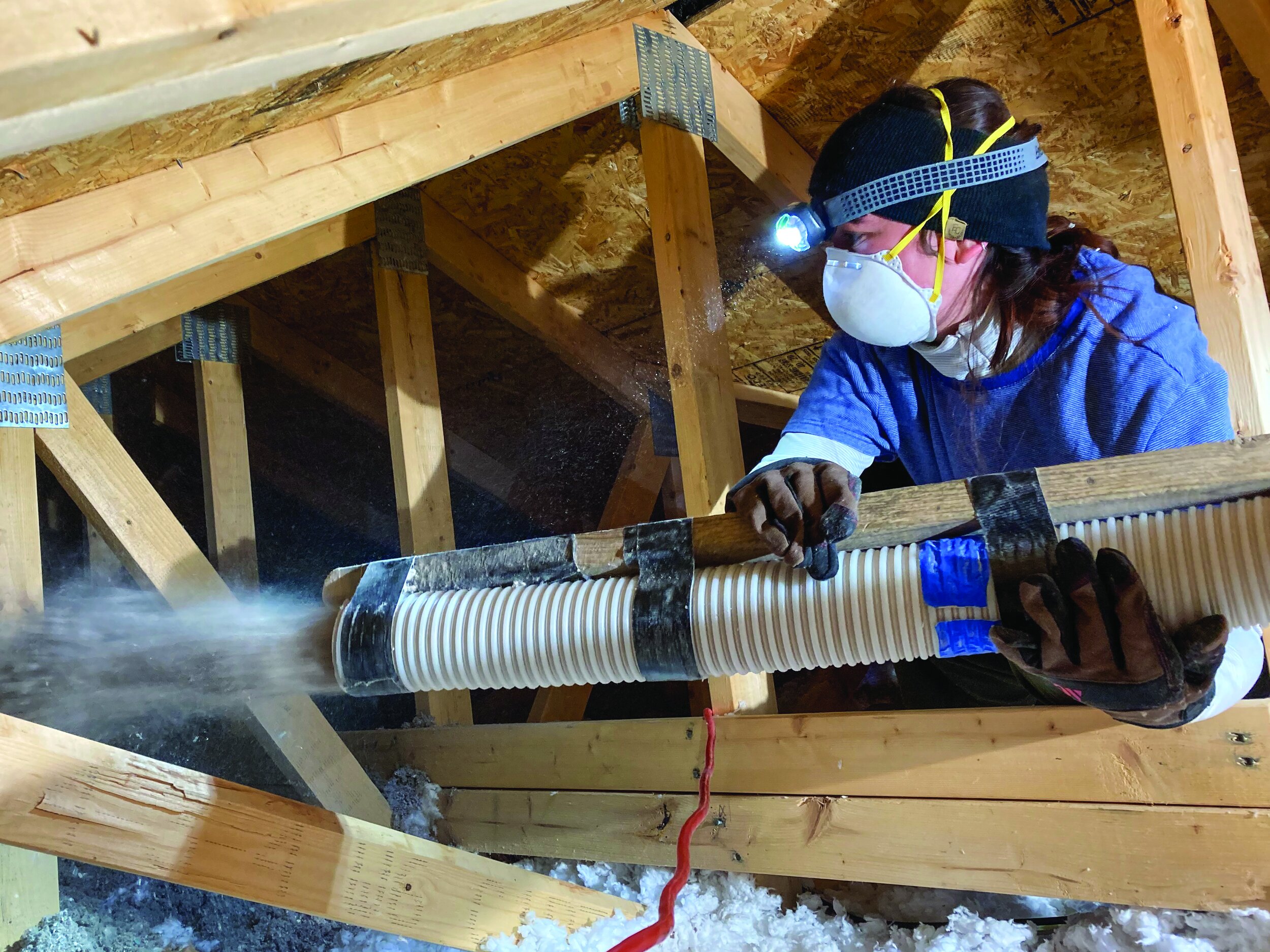Energized for change
By Rob Levin
A host of energy system improvements are occurring across campus as College of the Atlantic strives to meet its ambitious fossil fuel-free goals. Supported by funding from the college’s recent Broad Reach Capital Campaign, new grants, and federal and state energy programs, COA is moving step by step towards a net-zero campus.
Director of Energy David Gibson has spearheaded the charge to power the college as much as possible with renewable sources. Proper weatherization of many older buildings has been an important part of that effort. Last fall, Gibson secured a donation to purchase a cellulose insulation blower, which he has been training students to use in attics and walls. Concurrently, the Campus Committee for Sustainability (CCS) updated the COA Energy Framework by creating the COA Energy Policy, which enshrines the school’s goal to be fossil fuel-free by 2030. The policy was passed by All College Meeting in November 2022.
Students have been front and center in the efforts to move COA to a fossil fuel-free campus, whether through committee work, insulating and waterproofing buildings, or calculating residential energy needs. Renovations to campus buildings, on- and off-campus housing, and COA farm facilities have saved thousands of gallons of heating fuel annually while providing a range of learning opportunities.
“A lot of the science showing when we need to make these changes in order to sustain a livable earth states that they need to happen by 2030, but then if you look at a lot of larger-scale policies, they aim to be there by 2050. So I think that it’s really important that COA, as a school that has such strong values in sustainability, is a leading example in fossil fuel reduction,” says CCS co-chair Linnea Goh ’25. “This goal is also directly aligned with the goal that Bar Harbor has in their Climate Action Plan of achieving 100% renewable energy sourcing by 2030.”
Clean electricity lies at the center of COA’s efforts to move away from fossil fuels. In 2022, the school signed a 20-year contract with ReVision Energy to provide nearly 100% of COA’s electricity from a new solar field being installed just up the road in Hampden. The college is now using electricity for more and more of its heating, cooling, and hot water needs in the form of heat pumps. For the uninitiated, heat pumps are electric devices that can heat or cool a building by transferring thermal energy from outside air using the refrigeration cycle.
Heat pumps are now in place in the buildings and grounds headquarters, Studios 5 and 6, Cottage House, Carriage House, Peach House, Witchcliff apartments, and Witchcliff academic building. Gibson has also overseen installation of heat pump water heaters in many of these locations, along with the Arts and Science Building, Davis International Center, and The Turrets, while preparations have been made in Kaelber Hall for pre-heat to the oil-fired hot water heater for the Take-a-Break kitchen.
COA participated in an Efficiency Maine pilot program for commercial split system heat pump water heaters for Blair Tyson residences. This project was led by Ridgeline Energy Analytics, who had a complete domestic hot water system designed and engineered. The system completely removes the domestic hot water from the oil boiler system, saving around 2,000 gallons of oil per year, while demonstrating the viability of the technology for other facilities across the state.
“Even though it’s not as visible as some other projects we are working on, being able to source and heat our buildings with local electricity is leading the way towards a more sustainable way of having a house, while also teaching people how to live sustainably,” Goh says.
Over the 2022/23 winter break, five students worked with Gibson on insulation projects on campus. They installed a full vapor barrier in the Turrets basement and removed old drywall, damaged fiberglass insulation, and rotten wall studs. The space was then fully insulated with three inches (R-21) of spray foam, and is predicted to save around 1,000 gallons of heating oil each year, improve air quality in the building, and make the basement a more usable space.
Also on campus, Gibson and his crew installed nearly fifty 1.5 gallon-per-minute, low-flow showerheads throughout campus. This project, which students have informally reported has created a better shower experience along with being more environmentally friendly, is predicted to save around 250,000 gallons of water and 1,000 gallons of heating oil every year.
Energy improvements have also been afoot at off-campus properties. A dozen residential properties the college purchased in downtown Bar Harbor last year have been taken off fossil fuels entirely. The homes were air sealed and insulated, heat pumps for heating and cooling, and heat pump water heaters were installed in each building. All six apartments next door to the college that came online a few years ago were also air sealed, insulated, and equipped with heat pumps. All 18 properties were further set up with low-flow showerheads and LED lightbulbs by Ben Pannullo ’22.
Finally, a whole-house ducted heat pump system was installed at the farmhouse at COA Beech Hill Farm through an Efficiency Maine pilot program. The farmhouse there and the house at COA Peggy Rockefeller Farm were also super insulated and are now completely off of fossil fuels.
As of this writing, Gibson is working on securing $150,000 in funding to lead a professional development workshop focused on hands-on energy efficiency education for middle and high school teachers in the summer of 2023. This will include providing the teachers with all of the tools and materials needed to implement the lessons in their classrooms.
Photos: Alexandra Lofgren ’25, left, and Wejden Dhouib ’26 work on energy improvements in the basement of The Turrets. Celia Morton ’25, right, using the college’s cellulose insulation blower in an attic.


